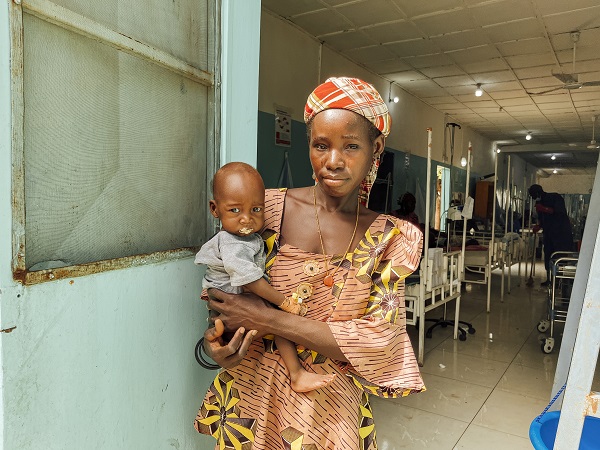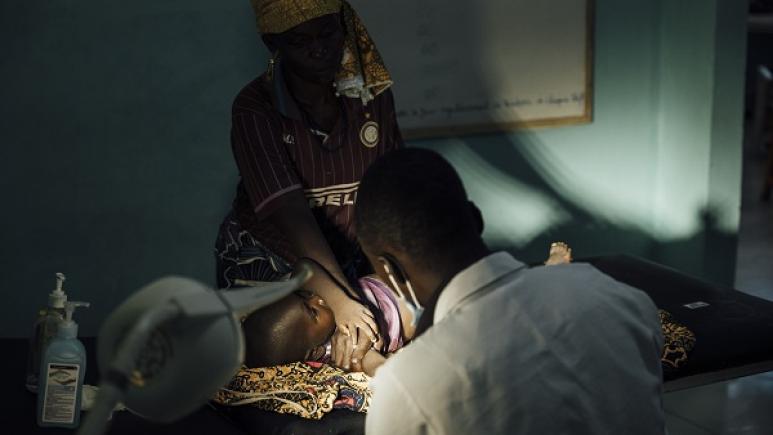GASTROSAM: A new approach to treating malnourished and dehydrated children
The links between malnutrition and diarrhoeal diseases are complex and interdependent, synergistically aggravating the health of affected children.
Malnutrition and diarrheal disease: a vicious cycle
According to Dr. San Maurice Ouattara, coordinator at Epicentre of the study in Niger, “diarrhea leads to a loss of crucial nutrients, which worsens the child's nutritional status, while malnutrition weakens immune defenses, increasing the risk of serious intestinal infections.”
As a result, malnourished children with diarrhoea often suffer from severe dehydration and secondary infections. A study carried out in Kenya showed that more than 50% of children hospitalized for severe acute malnutrition (SAM) had diarrhoea-related complications, associated with a poor prognosis, with a mortality rate of 21% (compared with 9% in children without diarrhoea) (1).
Effective rehydration remains an urgent priority for these children. The WHO recommendations for rehydration in this context are currently the subject of debate, due to their conservative nature. The use of intravenous (IV) fluids is reserved for situations of shock. And whether IV or oral, only low-sodium solutions are recommended.
The GASTROSAM study explores promising solutions using isotonic solutions to improve the care of malnourished children, building on preliminary studies carried out in Uganda. These solutions, already used for non-malnourished children, could offer more effective rehydration without harmful effects for malnourished children too.
GASTROSAM: Advancing care for malnourished and dehydrated children
The study is led by Prof. Peter Olupot Olupot, under the coordination of the KEMRI-Wellcome Trust Research Programme. The UK Medical Research Council is funding its implementation in Kenya and Uganda, while MSF Belgium is supporting it in Nigeria and Niger. In the latter country, it is supervised by the Epicentre center in Niger, in close collaboration with MSF Switzerland, which supports the Ministry of Public Health in the hospital care of children in Magaria. Present in Magaria since 2005, MSF Switzerland is committed to strengthening the capacity of the district hospital's pediatric unit by providing staff and training.
As part of the GASTROSAM project, two questions are being raised regarding rehydration strategies for children suffering from SAM and dehydration. The first question, identified as GASTROSAM-A, focuses on the best rehydration strategy for children with SAM and severe dehydration. To answer it, eligible children in the study, whose parents have given informed consent, are randomized into three groups and receive one of three interventions:
1. The standard protocol recommended by the WHO, based on oral rehydration with the use of intravenous fluids only in the event of shock.
2. Intravenous rehydration similar to that administered to a child with severe dehydration but no malnutrition.
3. The same volume of fluid as in the previous protocol, but administered slowly over an eight-hour period.
“If option 2 enables rapid stabilization of the patient's condition, option 3 could reduce the risk of complications associated with over-rapid rehydration,” comments San Maurice Ouattara.
The second question, referred to as GASTROSAM-B, focuses on the rehydration strategy for children with SAM and moderate dehydration. Children can either be admitted directly to this part of the study or be transferred from GASTROSAM-A to GASTROSAM-B following improvement in their condition. Two strategies are compared: either oral rehydration with Resomal, a low-sodium solution currently recommended by the WHO for moderate dehydration in children with SAM, or oral rehydration with a standard oral rehydration solution (ORS), usually used for a child with moderate dehydration without SAM.
These two parts of the study aim to determine the most effective and safest strategies for rehydrating children suffering from severe acute malnutrition, thus meeting a crucial need in paediatric care in precarious health contexts.
By comparing different rehydration strategies - including route of administration, flow rate and sodium concentration - researchers hope to improve the health and care of these vulnerable children. The GASTROSAM study should represent a crucial advance in identifying best rehydration practices and transforming the clinical management of malnourished and dehydrated children, who face a high risk of serious complications.
This study could ultimately serve to redefine the WHO recommendations and considerably improve the care of these vulnerable children.
- Talbert A, Thuo N, Karisa J, Chesaro C, Ohuma E, Ignas J, Berkley JA, Toromo C, Atkinson S, Maitland K: Diarrhoea complicating severe acute malnutrition in Kenyan children: a prospective descriptive study of risk factors and outcome. PLoS One 2012, 7(6):e38321.
crédit Photo : Hassia Usman/MSF

Hassia Usman (30) brought two of her four children to the District Hospital in Magaria, that is supported by MSF, to be treated. Both boys - Kakiriyaou Shapiou (7 month) and Saguiou Shapiou (2) - were admitted with Malaria and malnutrition. The older one additionally suffers from severe Diarrhea. The picture only shows the mother and her youngest, Zakiriyaou Shapiou. Even though the family has enough food, both children developed malnutrition. The family lives in Farfari, a village that is about 50 km form Magaria.
Copyright: Lena Pflüger/MSF








